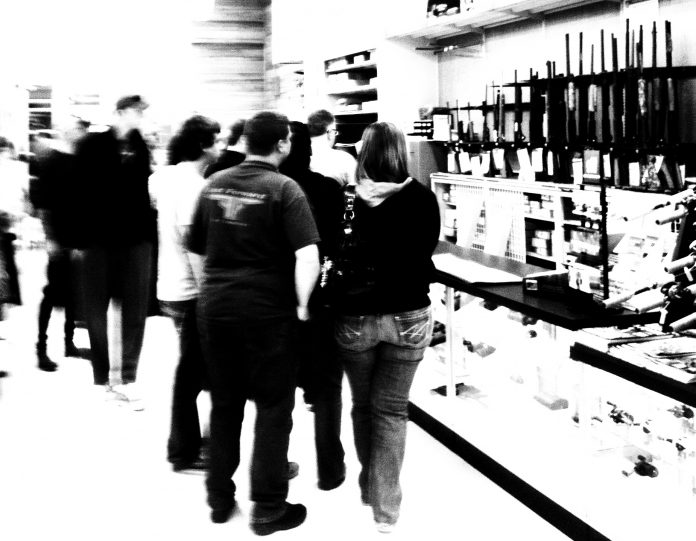The terrible killings in Gilroy, El Paso and Dayton have reignited the debate around gun regulations in the US. This debate has never fully gone away as activists on both sides of the issue are deeply engaged in this question at all times, but these maddeningly frequent mass shootings always draw more attention to the issue. This time even President Trump has said he would do something about it. However, given Trump’s deep ties to the far right and to gun activists as well as his incompetence on legislative matters, it would be a tremendous surprise if he accomplished anything or even remained committed to meaningful gun regulations for more than a few more days.
The debate around gun control has an unusual dynamic. Supporters of gun regulations make arguments around public health, saving lives and data that shows that limiting access to guns reduces murders and mass killings. Opponents give lip service to opposing these points, but more frequently refer to the Second Amendment, which they interpret to mean that the state cannot pass any laws limiting access to guns. Gun advocates use the Second Amendment not only as a rationale for their views, but as a way to squash any debate on the subject, particularly those grounded in data. Seeing gun advocates cite the Second Amendment in the face of every guard arguments brings up memories of Charlie Brown’s response when confronted with the dismal state of his baseball team.
All too frequently in the US, police act as judge, jury and all too frequently executioner, when they see a person of color with a gun, or in some cases something that looks, from a distance, vaguely like a gun
Although this dynamic is frustrating, the Second Amendment exists, is subject to widely varying interpretations and remains at the center of the debate around gun laws. Many committed to gun reform take the rational position that people who want to use guns for hunting or similar needs and activities should be able to buy guns in a regulated fashion, but that should it be more difficult for everybody else. This would make US laws more similar to those in most industrialized countries, almost all of which have far fewer deaths due to guns than the US. However, the Second Amendment refers, albeit ambiguously, to “a well regulated militia” not hunters and sportsmen.
It is also extremely significant that, regardless of how it has been interpreted, the Second Amendment has never been extended to people of color. All too frequently in the US, police act as judge, jury and all too frequently executioner, when they see a person of color with a gun, or in some cases something that looks, from a distance, vaguely like a gun. This is particularly important because as domestic terrorism, most heinously in the form of white nationalist terror, often nurtured by the racist president, increases, the Second Amendment serves to ensure the terrorists are armed. Today, the Second Amendment does not ensure that the citizens of the US can fight back against an authoritarian government-the childlike fantasy that many Second Amendment advocates cite for their need to stockpile military grade weapons-but to ensure that millions of Americans, most particularly non-whites and non-Christians live in fear of being murdered by a terrorist-therefore giving rights to white people while increasing the dangers facing others.
As domestic terrorism, most heinously in the form of white nationalist terror, often nurtured by the racist president, increases, the Second Amendment serves to ensure the terrorists are armed
The Second Amendment is thus not compatible with a modern diverse democracy. Democracies cannot function when all citizens, particularly those who are religious or racial minorities, live in fear and are occasionally killed as they seek to worship, shop, go to school or otherwise live their daily lives. Mass shootings, like all forms of terrorism, succeed not by killing enormous numbers of people, but by striking fear into the hearts of much a much larger population. All Americans live with that fear when we send our children to school, go shopping, attend a concert or go out on a weekend evening. Similarly, democracies cannot function well when civilians threaten to shoot other civilians because of political differences. Many progressives, including me, have been told by conservatives, on Twitter or in other ways, that “we have the guns.” This is a relatively clear threat to use violence against progressive voices. If political tensions among American citizens continue to rise the ubiquity of powerful weapons, particularly on one side, these threats could become real with increasing frequency. That would be a very damaging blow to American democracy.
Democracies cannot function when all citizens, particularly those who are religious or racial minorities, live in fear and are occasionally killed as they seek to worship, shop, go to school or otherwise live their daily lives
The Second Amendment is only one area where the tension between a US that lives according to a brilliant and groundbreaking document, but one that was written in a wildly different technological, moral and historical era and was the product of political compromises, including efforts to assuage the concerns of slave owners, and the US becoming a meaningful democracy in the modern understanding of that word, is extremely clear. The electoral college and the structure of the US Senate are two other high profile examples of this tension that is at the heart of the partisan divisions in the US today. The Democrats want to find a way for the US to become a pluralist democratic society while the Republicans are seeking to continue to live by a Constitution that helps them achieve their political success while implicitly helping ensure that white, straight, Christian Americans have more rights and freedoms than the rest of us.
www.lincolnmitchell.com
Follow me on Twitter at http://twitter.com/LincolnMitchell

